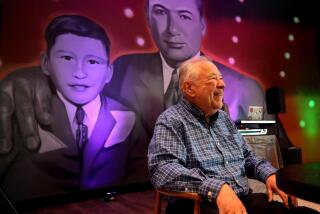âBlood In, Blood Outâ Gets Mixed Results in Test Run : Movies: The marketing strategy with Taylor Hackfordâs new film, set in East Los Angeles, is a first for Hollywood Pictures, Buena Vista.
From the director of âOfficer and a Gentlemanâ and the producer of âLa Bamba,â a new film opening for a limited engagement in . . . Tucson,nt Ariz . ?
Taylor Hackfordâs new film, âBlood In, Blood Outâ marks the first time Hollywood Pictures and Buena Vista Pictures--both subsidiaries of Disney--have released a drama about the lives of East Los Angeles Latinos, and the studio is handling its distribution with care. The film and its marketing campaign were given a recent weeklong test run in three cities: Rochester, N.Y., Tucson, and Las Vegas, the first time the studio has made such a move.
Before the brief release, the studio launched a full publicity campaign in each city, complete with TV and newspaper advertising and a visit from Hackford, writer-executive producer Jimmy Santiago Baca and the filmâs stars. The campaigns started about 10 days before the Jan. 20 opening, and the movie played at two or three theaters in each city.
Hollywood Pictures not only wanted to see how many people came to see âBlood In, Blood Out,â but who came to see it. The cities represent different ethnic mixes, with Las Vegas most closely resembling Los Angeles, where the story is set. Rochester is predominantly Anglo while Tucson has a large proportion of Latinos.
The story, written by Baca and Jeremy Iacone, follows the different lives of three cousins from East Los Angeles: a gifted painter who turns to narcotics after a brutal beating, a short-tempered boxer who becomes an undercover cop in his old neighborhood, and a half-Chicano gang member who goes to San Quentin and gets caught up in an interracial prison gang war.
Carol Cling, film critic for the Las Vegas Review-Journal, said that Disney representatives initially told her that the test run would determine if âBlood In, Blood Outâ would get a wide release.
Hackford was quoted in the Rochester Times-Union/Democrat and Chronicle that the run was to check the success of the marketing materials, not the film itself. Hackford could not be reached for comment.
Dick Cook, president of Buena Vista Pictures Distribution, said âBlood In, Blood Outâ will get a wide release, but a firm release date has not been set. The studio is âstill coming up with an evaluation of the campaign and how it worked,â he said.
âAny time youâre dealing with an epic-type movie that deals with so many emotions and family values and all . . . (the campaign) takes on so many aspects of it that you want to convey,â he said. âTrying to put anything of substance into a 30-second TV spot is difficult.â
Buena Vista ran about half a dozen different TV ads at various times of the day, as well as print advertising. Cook said the experiment went very well and that audiences âthat weâve (polled) during that week (and earlier test-screening audiences) have loved the movie.â
Box-office figures for the screenings were not released.
The movieâs 2-hour, 54-minute length and lack of recognizable stars mean that its advertising is critical. Violent social dramas are not typical of Hollywood Pictures, where recent productions include Eddie Murphyâs comedy âThe Distinguished Gentlemen,â the animated feature âAladdinâ and the sentimental comedy âThe Cemetery Club.â
The film has also been frequently compared to Edward James Olmosâ âAmerican Me,â which came out in March 1992. Both films were shooting on the streets of East Los Angeles in the summer of 1991 and involved writer Floyd Mutrux at different stages of script development. âAmerican Meâ is about Santana (Olmos), a kingpin in the Mexican Mafia within the California penitentiary system. âBlood In, Blood Outâ spends the most time with Miklo (Damian Chapa), the character who winds up in a prison gang in San Quentin. âAmerican Meâ made $13-million for Universal in the United States and Canada.
As with other films depicting urban violence, Hollywood Pictures executives are concerned about the possibility for violent incidents at theaters. In the mid-1970s, such outbreaks contributed to the box-office failures of âBoulevard Nightsâ and âWalk Proud,â both about Latino gangs. More recently, violence at âBoyz N the Hoodâ and âJuiceâ have caused concern.
There was only one notable instance of violence during the pre-release release. Theater managers in eastern Las Vegas, where the cityâs Latino population is centered, called in police to break up a crowd after they canceled a weekend late show, but no one was hurt.
But violence may only be a concern if people go to the theaters. Critical reception in the cities where âBlood In, Blood Outâ opened was mixed.
John Jennings, film critic at the Tucson Citizen, wrote that the film treats the Latino community with respect, but âat times wanders through fields already plowed by âThe Godfatherâ and âColors.â â
Jack Garner, critic at the Rochester Times-Union/Democrat and Chronicle, commented that âBlood In, Blood Outâ felt about 30 to 40 minutes too long. âWith no larger-than-life character or single, overpowering dramatic thread, it plays a bit like âLawrence of Arabiaâ without a Lawrence,â he wrote in his review.
Arizona Daily Star critic Robert Cauthorn also criticized the length: âThe idea that someone made âBlood In, Blood Outâ is wonderful; the reality of sitting through it is another matter altogether.â
In Las Vegas, the movie fared passably on the more Anglo west side of the city, the Review-Journalâs Cling said, but did better on the east side. Cling gave the film four stars out of five, largely because of the important topics the story dealt with, she said.
More to Read
Only good movies
Get the Indie Focus newsletter, Mark Olsen's weekly guide to the world of cinema.
You may occasionally receive promotional content from the Los Angeles Times.










